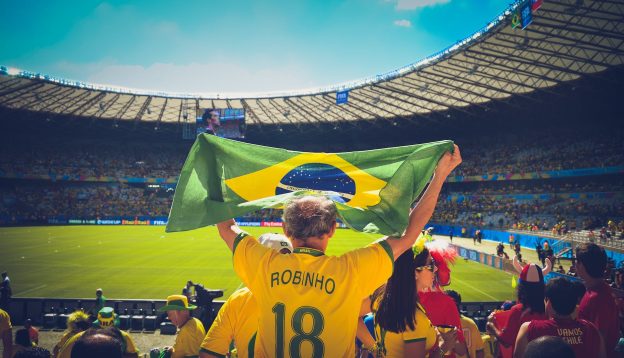The World Cup has kicked off last week – and here we are again, in this weird mood that takes over Brazil every four years. To me, the difference is that my circles have actually expanded since last time, and therefore some people might find it weird that I’m not “in the mood” for rooting for the Brazilian team.
All of that, by the way, has nothing to do with the hijacking of the soccer symbolism by the far right. My disillusionment with the team is over twenty years old by now, since the group that went to France ’98. Although they played better than the ’94 team, it was surrounded by ego wars and controversy (not to mention the whole “thing” with Ronaldo).
Brazilian Team, but not Brazilian soccer
That ’98 team was the first one to have more players that were active overseas. At least in principle, I have no ill will against someone playing in another country. It they are a good player, they have the right to play wherever they want.
That being said, in Brazil everything is a little bit different. That’s because, like in other areas of human activity, we’re no more than a “supplier”. Young Brazilians are a kind of commodity; Brazilian teams select and train them, at a very young age. When individual talent becomes obvious, they are soon shipped off to some other team, usually in Europe. And then their “success” is declared, and they become a “viable” alternative for a spot in the Brazilian national team.
But for 2022, out of the TWENTY SIX Brazilian players in Qatar, THREE play in Brazil. A set like this has no possibility whatsoever of representing what Brazilian soccer really is. The arbitrary fact that they were born here is nothing short of a coincidence. The quality of the soccer they play is a combination of several factors. The main ones are their own natural talent and their physical conditioning, which is cultivated by the teams where the play,
Meanwhile, in Brazil, with the exception of the “great clubs”, teams go through severe financial difficulties, and terrible conditions for practice and matches. Athletes are led to split their time between “professional” soccer activity and “regular” jobs, so they can sustain their families. They just cannot afford the minimum requirements for surviving just on the salary they get playing for the smaller clubs. That is, when work conditions aren’t bad enough. Stuck between low salaries, career insecurity and crooked club executives, some of them just give up.
Is that the “country of soccer”? Is that the “art soccer” that the world us used to seeing associated with the yellow shirt?
Of course, not.
When you make the bed…
Brazil has had some really spectacular teams in the past. The guys from 1970, with Pelé, Rivelino and Antonio Carlos. Or the team of 1982, with Zico, Sócrates and Falcão. And that’s the kind of soccer that the world is used to seeing played by the Brazilian team. But Brazilian soccer is not even a shadow of that. Between individual talent and absurd salaries they get, the convened players in the Brazilian national team are the antithesis of Brazilian soccer.
So much so that one of the marks of the Brazilian team is the absence of familiarity among players. When a new team is announced the “analysts” always start talking about training, because that’s when the head coach is actually going to make some sense of the players he has and how he can actually build a tactically sound team with that. And the result is what is seen on the field, with eleven individually gifted athletes and happen to wear shirts that look alike. They are not a team because they barely know each other.
When a play results in a goal, it usually comes from an individual play or from previous familiarity among the players involved, not necessarily related to the national team but to having played together elsewhere. For example, in today’s match against Switzerland, the only goal in the match came from a play among three guys (Rodrygo, Casemiro and Vinicius Jr) that did it over and over again, in Real Madrid.
Geopolitics in play
Another important point is the “geopolitical configuration” of the Brazilian team. Among the teams with higher ranking in the world’s soccer outline, it is one of the very few that comes from a “third world” country. The strongest teams are usually from Europe: Italy, Germany, Spain, France, Netherlands… Countries that greatly benefited from the colony-metropolis dynamics that dominated the world for centuries. Even today that still drives economy and politics in international relations.
But I had never really stopped to think about it, until I saw this:

Brazil is the team of the excluded; of the yellow, blacks and browns in the outskirts of the world.
a Brazilian rooting against Brazil is not against a team: they are against the Third World”
It’s not without reason, at least at first. And it’s a valid opinion. But, after thinking about it for a bit, I can’t really agree with that. What about all other teams that are not from the “elite” of international soccer? Are they not representative? What about African and Asian teams, what do they represent, then?
It’s kind of stupid to talk about “rooting against Brazil”. I root against the Brazilian team. The first reason is what I said before. The second one, related to that, is the fact that the shirt represents one thing, but the players represent another.
See, I respect the individual achievements of each one, and they have all merit for having managed to establish themselves in the great European teams.
But, at the same time, they are also exactly what has always been done with countries that were colonized across history: the “metropolis” expropriates national riches from other countries and takes them for itself. In some cases, quite literally, with players that get nationalized to be able to play for other national teams.
But when 88% of a team is made out of people that play overseas, they represent the soccer that is played in those countries as well. And, by the transitive property, they represent those countries as well.
Politics in Soccer
Asshats will say that “soccer is not the place for politics”. I’m not even going to dignify that discussion because it is stupid. Human beings are political creatures, and everything we do is political. Saying that there can not be politics in something is complete nonsense, and, at the very least, intellectual dishonesty (or just sheer immorality).
That being said, I think it’s relevant to take into account the political stances of the players. Looking at that, NONE of them took a clear, definite stance in the past elections. It’s important to note that, even if some of them did show some ethical and moral fiber (like Richarlison, for example).
Besides, the 2022 elections were more important not just because of the government’s philosophical, political and economical position, but for the plain and simple survival of Brazilian democracy. Like I said in an Instagram post, it was not much of an election, but more of a referendum for a dictatorship.
I don’t feel comfortable rooting for the success of a team that puts into play – at the starting lineup! – people that openly support a fascist government, that actively tried to destroy everything in this country. Especially when one of these assholes, who dodged millions in taxes, is on the team.
Root if you want
So it’s not a random thing, not rooting for the Brazilian team. I have some serious restrictions regarding several aspects of the team, and therefore I choose to, at best, not root against. Which feels ironic, since there is a lot of people in this country that like to feel superior by claiming to stand “above” the whole “polarization issue” (between democracy and fascism).
Finally, this is just my opinion. I understand and welcome the position of those that decide to root for the Brazilian team, for whatever reason, or just because they identify with Brazilian pride for having the only team that has been champion for six times, which I must admit is a very significant distinction.







Leave a Reply